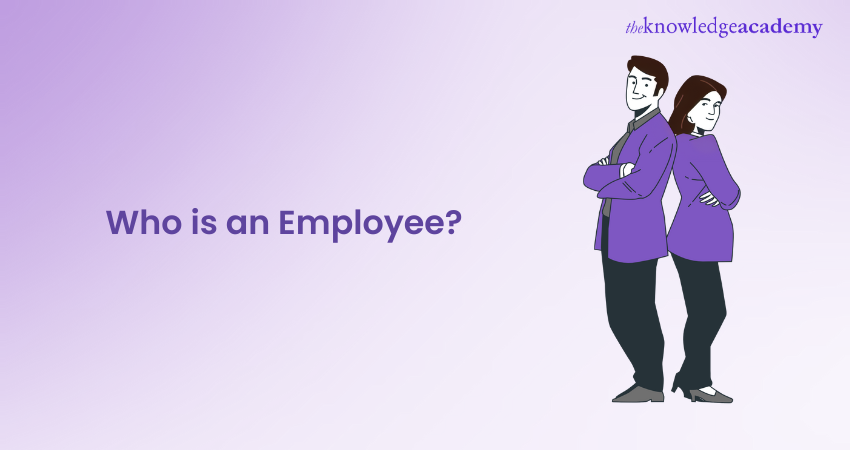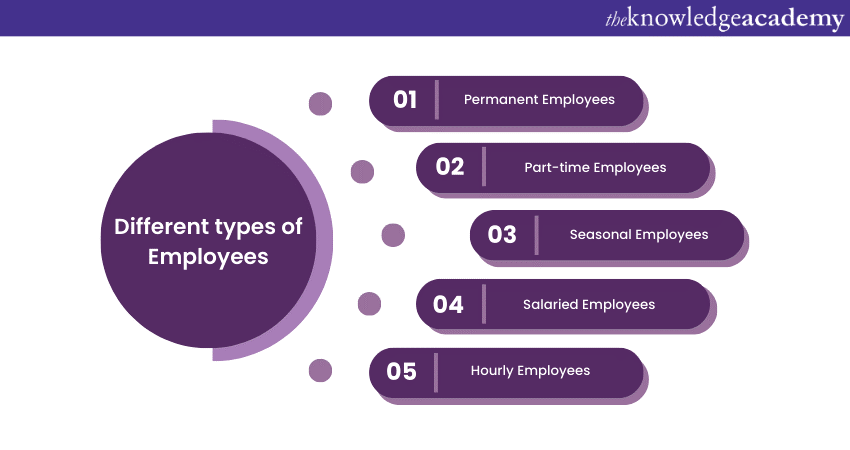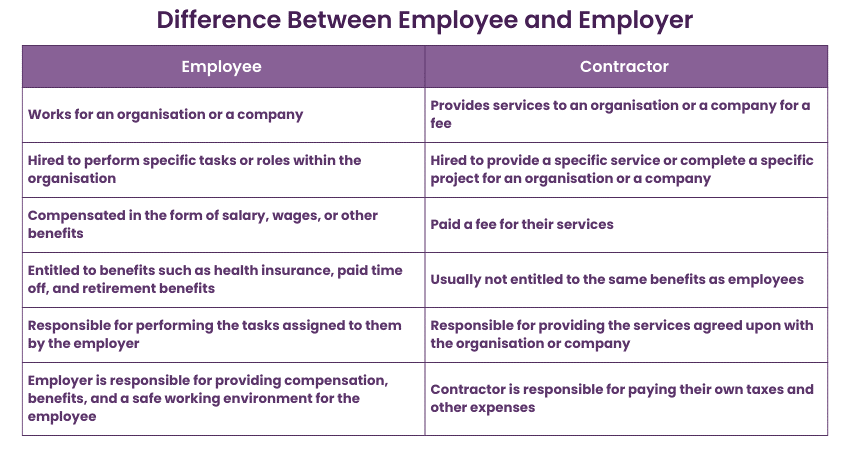We may not have the course you’re looking for. If you enquire or give us a call on 01344203999 and speak to our training experts, we may still be able to help with your training requirements.
Training Outcomes Within Your Budget!
We ensure quality, budget-alignment, and timely delivery by our expert instructors.

An Employee is more than just a job holder. It’s about being part of a team where each person’s skills and dreams count. Who is an Employee? Maybe it’s the one who works hard every day, or maybe it’s the dreamer who inspires others. We'll discover that being an Employee isn't just about a title—it's about being a valuable part of a team where everyone's unique contributions matter. Let's explore the roles and responsibilities of an Employee!
Table of Contents
1) Who is an Employee?
2) What does an Employee do?
3) Different types of Employees
4) Difference between Employee and Employer
5) Difference between Employee and Contractor
6) Conclusion
Who is an Employee?
An Employer engages Employees to perform designated tasks or roles, offering financial remuneration. The Employer must equip the Employee with the necessary resources and tools to fulfil their job. Beyond these provisions, Employees possess a set of rights and obligations subject to variation based on the nature of their employment.
What does an Employee do?
The Employee's functions differ from one field of activity to another, as do their respective jobs.. Nevertheless, workers often have to do their work when it is assigned to them by the Employer. On the other hand, they might be expected to attend meetings, team up with other workers, and hold discussions with clients or customers.
For example: A worker in a shop may perform such tasks as stocking shelves, helping customers, and operating a cash register . A worker in an office may be involved in answering phones, replying to emails, or filing documents. An Employee in a factory may be engaged in tasks like operating a machine, assembly products or performing quality checks.
Different types of Employees
Different types of Employees are classified based on their employment status. Let’s take a look at them below:

Permanent Employees
Permanent Employees are hired for an indefinite period of time and are entitled to all the benefits and protections that come with being an Employee. Let's explore some of the benefits:
1) Health insurance
2) Paid time off/vacations
3) Retirement benefits
Typically, Employees are expected to work full-time and are compensated with a monthly or hourly wage. Permanent staff members are essential to any organisation, providing stability and ongoing operations. Additionally, they are afforded opportunities for career development and professional advancement.
Part-time Employees
The difference between full-time and part-time Employees is that part-time Employees work fewer hours than full-time Employees, and are not entitled to the same benefits as full-time Employees. Nevertheless, They might be qualified for some benefits which include health insurance. They mainly get an hourly pay, and their working schedule is flexible.
Part-time Employees tend to be students, retirees, or people who value a balance between work and private life. They are an affordable backup workforce for businesses with limited budget but need someone else.
Seasonal or temporary Employees
Seasonal or temporary Employees are hired for the duration of a particular period, such as, the holiday season or a one-off project. They frequently tend to be deprived of the right to the same privileges as permanent staff. They are mostly paid on an hourly basis and have a flexible time schedule.
Sometimes, retailers with a seasonal product demand hire Seasonal workers to ensure the higher production or sales during a particular period of the year. They are anefficient way of dealing with the extra volume of work during the peak seasons.
Salaried (Exempt)
Employees on Salary are paid a fixed amount for the specified number of working hours. They are not entitled to overtime wages or other wage and hour laws. They are usually expected to work full-time hours.
Salaried Employees are often professionals with managerial or executive positions within an organisation. They are responsible for making important decisions that affect the business.
Hourly (Non-exempt)
Hourly Workers are generally paid hourly wages for the hours they work. They are entitled to the overtime payment and otherpay-by-hour protections. They might work full-time or part-time, depending on their requirement level. Hourly Employees usually hold an entry-level position where they undertake either manual duties or office work in the organisation. They are an integral aspect of any company, completing daily tasks to make the organisation's function better and smoother.
Gain a detailed understanding of HR Management with our Certified HR Advisor Course – Sign up now!
Employment rights
These are some of the Employment Rights guaranteed to Employees:
1) Statutory sick pay.
2) Statutory maternity pay and leave.
3) Statutory paternity pay and leave.
4) Statutory adoption pay and leave.
5) Statutory shared parental pay and leave.
6) Minimum notice periods are available if their employment ends, for example if an Employer dismisses them.
7) Protection against unfair dismissal.
8) The right to request flexible working.
9) Time off for emergencies.
10) Statutory redundancy pay.
Some of these rights require minimum continuous employment before an Employee qualifies. An employment contract may state the length of this qualification period.
Tips for hiring Employees
Getting the right people on board is a major factor for in the development of any small business. Here are a few tips to hire the right people for the organisation:
1) Check regulations in your area: Research and learn more about state and local labour laws to be sure you are not violating anything pertaining to working contact. Tracking what the regulations are in your area will help you decide whether part-time or full-time team members are most suitable for you.
2) Envision their workweek: Highlight all the tasks you ‘d like to give to an Employee and give out the estimated hours you ‘ll need to complete them. This may, therefore, assist you in determining the number of workers to be hired and writing the detailed job descriptions.
3) Prepare your forms: While hiring a new Employee, you will be required to avail them with the tax forms and new Employee documentation to see through the Employer process. Before extending an offer, you can send the candidate application form or have copies on hand for them to take and complete.
4) Look into insurance: Insurance is not compulsory in all states. However, you can enhance your Employees' job security by getting worker’s compensation and disability insurance to protect you from liability and other unforeseen circumstances.
5) Offer benefits: Add-ons like paid leave or work-life balance measures contribute to the recruitment of top-notch candidates.
6) Create Human Resources policies: Creating workplace policies and procedures for dealing with misconduct, sick leave, and other HR matters can help you comply with government rules and regulations.
Difference between Employee and Employer
An Employee is a person who does a job either in a firm or a company. They are employed to undertake certain functions or work in the enterprise and are accordingly rewarded by the company through payments, wages or other perks. Nevertheless, the Employer is the person or entity who contracts an Employee.
The Employer is one who pays wages, provides Employee benefits, and provides conducive working conditions to the worker. The Employer has the power to delegate work to Employees, appraise their performance, and make business-based decisions that affect the overall functioning of the business.
The fact that an Employee works for an organisation or a company that hires them and their Employer is the person or entity that does this are the main differences between an Employee and an Employer. The Employer has to offer adequate compensation and benefits as well as provide a good working atmosphere for the Employee, who, on the other hand, must work according to the instructions from the Employer.
An Employee has a contractual relationship with an Employer, which opens up the obligations that both parties must fulfil.
Master the intricacies of employment law with our Employment Law Training – Sign up now!
Difference between Employee and Contractor
An Employee is a person who works for an organisation or a company. They are hired to perform specific tasks or roles within the organisation and are compensated in the form of salary, wages, or other benefits.
On the other hand, a Contractor is a person or entity that provides services to an organisation or a company for a fee. Contractors are usually not entitled to the same benefits as Employees, and they are responsible for paying their own taxes and other expenses.

The key difference between an Employee and a Contractor is that an Employee works for an organisation or a company, while a Contractor provides services to an organisation or a company. Employees are usually hired to perform specific tasks or roles within the organisation and are compensated in the form of salary, wages, or other benefits.
Contractors, on the other hand, are usually hired to provide a specific service or complete a specific project for an organisation or a company. They are usually paid a payment for their services and are accountable for paying their own taxes and other expenses.
In essence, the main difference between an Employee and a Contractor is that an Employee works for an organisation or a company, while a Contractor provides services to an organisation or a company. Employees Benefits include health insurance, paid time off, and retirement benefits. On the contrary, Contractors are usually not entitled to such benefits and are liable for paying their own taxes and other expenses.
Conclusion
We hope you read and understand What is an Employee. Employees are an essential part of any organisation. Understanding the different types of Employees can help you make well-versed decisions about your business or career.
Unlock your full potential with our HR Courses – Sign up today!
Frequently Asked Questions

Understanding Employees ensures legal compliance, defines employment relationships, manages taxation and benefits, organises resources, upholds rights, and fosters workplace productivity.

Employees contribute to an organisation's success by utilising their skills, knowledge, and dedication to achieve goals, foster innovation, deliver quality products/services, and maintain a positive work culture.

The Knowledge Academy takes global learning to new heights, offering over 30,000 online courses across 490+ locations in 220 countries. This expansive reach ensures accessibility and convenience for learners worldwide.
Alongside our diverse Online Course Catalogue, encompassing 17 major categories, we go the extra mile by providing a plethora of free educational Online Resources like News updates, Blogs, videos, webinars, and interview questions. Tailoring learning experiences further, professionals can maximise value with customisable Course Bundles of TKA.

The Knowledge Academy’s Knowledge Pass, a prepaid voucher, adds another layer of flexibility, allowing course bookings over a 12-month period. Join us on a journey where education knows no bounds.

The Knowledge Academy offers various HR Courses, including Certified HR Advisor Training, Certified HR Manager Course and Certified Training & Development Manager Course .These courses cater to different skill levels, providing comprehensive insights into Top 25 HR Interview Questions.
Our Business Skills Blogs covers a range of topics offering valuable resources, best practices, and industry insights. Whether you are a beginner or looking to advance your skills, The Knowledge Academy's diverse courses and informative blogs have you covered.







 Top Rated Course
Top Rated Course




 If you wish to make any changes to your course, please
If you wish to make any changes to your course, please


